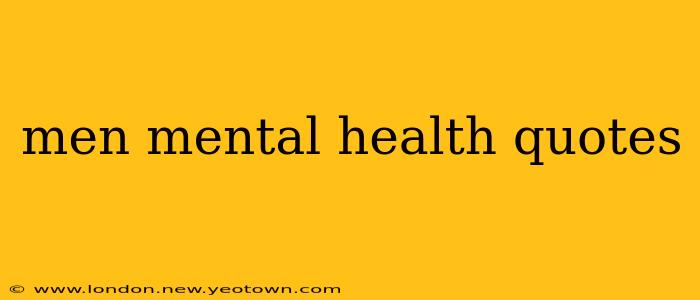It's a story we often hear whispered, a struggle often hidden behind a façade of strength. The story of men's mental health. For too long, societal expectations have pressured men to suppress their emotions, to wear a mask of invulnerability. But the truth is, men experience mental health challenges just as women do, often with different manifestations and unique obstacles. This journey into the world of men's mental health starts with understanding, acceptance, and the power of words. We'll explore some powerful quotes that capture the essence of this often-overlooked struggle, and delve into the crucial questions surrounding it.
The Silence and the Strength: Understanding Men's Mental Health Challenges
The weight of expectations, the pressure to be the "strong, silent type," can be crushing. Men often internalize their struggles, leading to isolation and a reluctance to seek help. This silence can be deadly, contributing to higher rates of suicide among men compared to women. Breaking this silence requires a shift in societal norms and a greater understanding of the unique pressures faced by men.
What are some common mental health challenges faced by men?
Men frequently experience mental health issues like depression, anxiety, and PTSD, but these may manifest differently than in women. For instance, depression in men might present as irritability, anger, or reckless behavior rather than sadness or hopelessness. Anxiety might manifest as substance abuse or workaholism. Recognizing these varied presentations is crucial for effective support.
How can men overcome the stigma associated with mental health?
The stigma surrounding men's mental health is a significant barrier. It prevents men from seeking help, fearing judgment or ridicule. Overcoming this stigma requires open conversations, shared experiences, and a supportive community. Encouraging men to talk about their feelings, validating their experiences, and promoting empathy are essential steps.
Powerful Quotes Illuminating the Male Experience
Words have power. They can offer comfort, validation, and a sense of shared experience. Here are some powerful quotes that reflect the complexities of men's mental health:
-
"The strongest men are not those who have never cried, but those who cried and then stood up" – An anonymous quote that highlights resilience in the face of emotional vulnerability.
-
"It is okay to not be okay" - A simple yet profoundly impactful statement that gives permission to acknowledge and accept difficult emotions.
Seeking Help: It's a Sign of Strength, Not Weakness
The journey to better mental health often begins with a single step – reaching out for help. It's a sign of courage, not weakness, to acknowledge that you need support. There are resources available, from therapists and support groups to helplines and online communities.
Where can men find resources and support for their mental health?
Numerous organizations offer dedicated support for men's mental health. These resources provide confidential counseling, peer support groups, and valuable information. Online forums and communities also provide spaces for men to connect and share their experiences.
What are the benefits of seeking professional help for mental health concerns?
Professional help offers a safe and confidential space to explore your feelings, develop coping strategies, and receive personalized support tailored to your specific needs. It's an investment in your well-being and can significantly improve your quality of life.
A Call to Action: Breaking the Silence, Building Support
The conversation about men's mental health needs to continue. We must challenge societal expectations, break the silence, and build a supportive community where men feel comfortable seeking help without fear of judgment. Let's foster a culture of understanding, empathy, and resilience. Remember, it's okay to not be okay, and seeking help is a sign of strength, not weakness. Let's work together to create a world where every man feels safe, supported, and empowered to prioritize his mental well-being.

